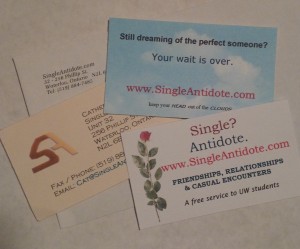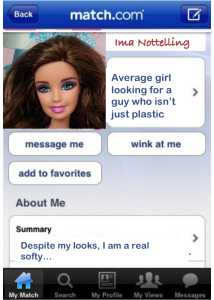So the truth is now out. Binary Tattoo is not my first company. Back in 1999, my boyfriend (now husband) and I created Single Antidote, a dating website. It was a full-fledged business with a bank account, phone number and stationary, all launched from the lovely basement of our student dwellings. It was very dot-com of two engineering students to launch a website from our ‘dorm’. The concept was simple: a dating site targeted at university students that allowed you a profile page and housed an internal messaging system for anonymity. The site had 4 typical categories (men-seeking-women, men-seeking-men, women-seeking-men and women-seeking-women). In addition to the software for the website, we designed, wrote and managed the entire database which contained both profiles and messages. We ran the company at our school for about 6 months, in which time we had over 1000 members. We were making scant money on advertising and were busy with school work, so after that time period, we gave the system away to the school council and eventually they let it slide. On the upside, we are aware of several matches actually made from the site (via friends who used it). On the downside…. NO PRIVACY POLICY.
 Other than a tagline on the pages asking people to report misuse of the system, we had nothing written as to the protection of people’s information. Even today, there is a CD somewhere with the personal messages and details for over 1000 people. This is a great example of where people trustingly gave private information away with no assurance as to who was using it or where it was going.
Other than a tagline on the pages asking people to report misuse of the system, we had nothing written as to the protection of people’s information. Even today, there is a CD somewhere with the personal messages and details for over 1000 people. This is a great example of where people trustingly gave private information away with no assurance as to who was using it or where it was going.
Risks
Online dating has become extremely popular – 2013 stats show as many as 17% of today’s marriages are couples that met online. Makes sense in a digital age!
Like any other social network, online dating sites come with their own risks, maybe even more because of the very personal nature of the information you are giving away. For example, dating sites have a much higher record of maintaining your data even after you have cancelled your profile. They do this in case you come back. Not sure what that says about how well their matching works. Also sites like OK Cupid have their profiles indexed by Google. That means that someone could turn up your profile on a search – minus the pictures and name but with all other info.
I thought I’d do some digging and read through the Terms & Conditions from several popular sites. Seems like reading T&C has become a hobby for me lately. Either way, I dug up some juicy examples of privacy policies below.
 eHarmony – a popular site where users fill out a 400 question survey and are matched according to an algorithm that analyzes their answers.
eHarmony – a popular site where users fill out a 400 question survey and are matched according to an algorithm that analyzes their answers.
” In addition to sharing your information with your matches, we may allow your matches to share your profile information with members of their social network(s). ”
OK Cupid – a service which also suggests matches but where you can rank people you like.
“You should appreciate that all information submitted on the Website might potentially be publicly accessible.”
 Ashley Madison – their tagline is “life is short. Have an affair”. They have millions of married members seeking discreet affairs. Due to the nature of their offering, their terms are littered in legalese.
Ashley Madison – their tagline is “life is short. Have an affair”. They have millions of married members seeking discreet affairs. Due to the nature of their offering, their terms are littered in legalese.
“You acknowledge that although we strive to maintain the necessary safeguards to protect your personal data, we cannot ensure the security or privacy of information you provide through the Internet and your email messages.”
 Grindr – a site that allows gay men to find other gay men in their proximity via geolocation.
Grindr – a site that allows gay men to find other gay men in their proximity via geolocation.
“Third Parties. Our advertisers and partners may also use their own cookies or other tracking technology which may collect information about you within the Grindr Services. We do not control use of these tracking technologies used by advertisers and partners and expressly disclaim responsibility for information collected through them. ”
Bottom line? None of these sites guarantee that your messages are private, nor that your location or profile information are secure.

5 Tips to Protect Yourself
If you (or someone you know) is one of the millions who are using online dating sites, here aresome tips to protect yourself and your data so that you can enjoy a safe experience.
Turn off geolocation on your posted pictures
Much like other sites, your profile picture is public. In the case of a dating site, you may have several. These pictures can be viewed and in some cases there is location data attached to the photos. Free software can pull this location data off the photo that selfie you took in your bathroom may actually contain your home location. You can usually turn this off in the settings of your mobile phone under ‘Location’ or ‘Geolocation’. Not to be confused with allowing the actual site access to your location. Pictures are tagged at the time of taking not loading.
Read your terms and conditions
I know, it can be a drag, but there is a lot of personal information on a dating site and even if you think it is anonymous, your picture or email address could one day get linked to you and you want to make sure you are comfortable with what they may do to your data or pictures. Most of the T&C I looked through were actually fairly short so take a look.
Ensure there is HTTPS
When you have signed in to the site, looks for that extra ‘s’ in the website address or the symbol of the lock in the address bar. It means your connection is secure so that other companies cannot take your information while you are on the site.
Use a throw-away email account
Your email address is tied to the account so now is a great time to create a ‘throw-away’ which is a new email address that you use just for that site. That way there are no ties back to your other accounts.
Do not sign in via another site
Be wary of signing in via Facebook Connect or Google+. This typically permits the dating site to access all of your info on that social network and thereby removes any anonymity you may have had.



Leave a Reply